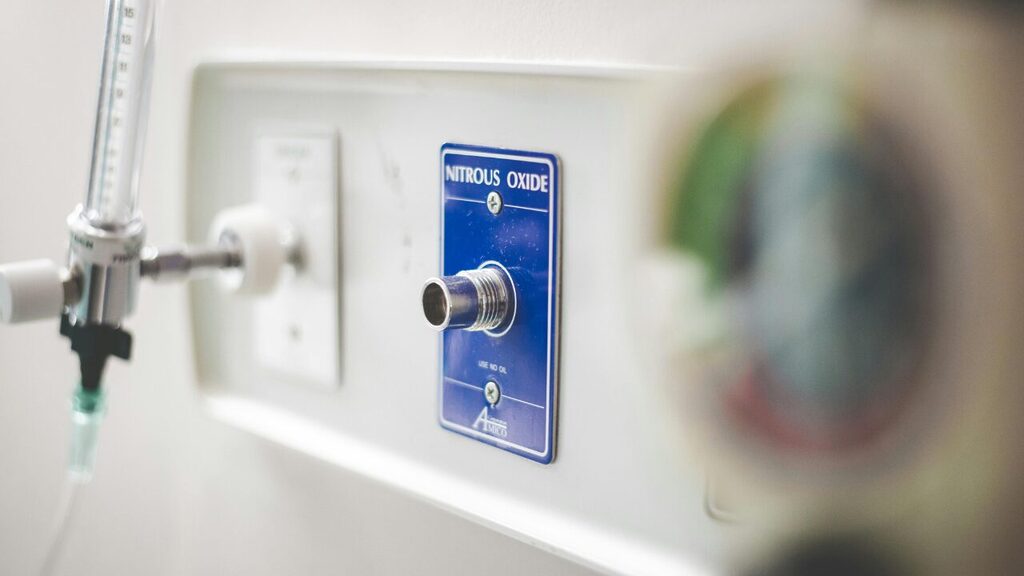Nitrous oxide, commonly known as “laughing gas,” has emerged as a concerning trend in substance abuse. This colorless, sweet-smelling gas, once confined to dentist offices and whipped cream canisters, now poses a significant threat to public health as recreational use skyrockets.
What is Nitrous Oxide?
Nitrous oxide is a chemical compound with legitimate medical and industrial uses. In healthcare, it serves as an anesthetic and analgesic, particularly in dentistry. Food industry applications include its use as a propellant for whipped cream. However, its euphoric effects have led to increasing misuse.
The Recreational Appeal
Users inhale nitrous oxide for a quick high, experiencing a brief but intense euphoria, often accompanied by fits of laughter – hence the nickname “laughing gas.” This short-lived effect, typically lasting only a few minutes, often leads to repeated use within a short period.

Short-Term Effects
Immediate effects of nitrous oxide inhalation include:
- Dizziness
- Lightheadedness
- Euphoria
- Distorted perceptions
- Impaired coordination
While these effects may seem harmless, they can lead to accidents, falls, and impaired decision-making.
Long-Term Health Risks
Repeated nitrous oxide abuse can result in severe health complications:
Vitamin B12 Deficiency
Nitrous oxide inactivates vitamin B12 in the body. Chronic use can lead to severe B12 deficiency, causing:
- Anemia
- Fatigue
- Depression
- Memory problems
Nerve Damage
B12 deficiency can result in peripheral neuropathy, causing numbness, tingling, and pain in extremities. In severe cases, this damage may be irreversible.
Cognitive Impairment
Long-term abuse can lead to cognitive decline, affecting memory, attention, and problem-solving abilities.
Psychiatric Effects
Regular use may exacerbate or trigger mental health issues, including psychosis and depression.
Legal Status and Accessibility
The legal status of nitrous oxide complicates efforts to curb its abuse. While illegal for recreational use, its legitimate applications make it readily available. Users often obtain it through:
- Whipped cream chargers (“whippits”)
- Online purchases
- Diversion from medical or industrial supplies
This accessibility, combined with a perception of safety due to its medical use, contributes to its growing popularity as a recreational drug.
Challenges in Treatment for Nitrous Abuse
Addressing nitrous oxide addiction presents unique challenges:
- The short duration of effects can lead to compulsive, frequent use.
- Many users don’t perceive nitrous oxide as addictive or dangerous.
- Physical dependence is less pronounced than with other substances, making psychological addiction the primary focus of treatment.
Texas Recovery Centers’ Approach
At Texas Recovery Centers, we recognize the emerging threat of nitrous oxide abuse. Our comprehensive treatment approach includes:
- Thorough medical evaluation to assess and treat any physical damage, particularly B12 deficiency and nerve issues
- Cognitive behavioral therapy to address underlying reasons for use and develop coping strategies
- Education on the risks and long-term consequences of nitrous oxide abuse
- Holistic therapies to support overall well-being and recovery
- Aftercare planning to prevent relapse and support long-term sobriety
Warning Signs and Early Intervention for Nitrous Abuse
Recognizing the signs of nitrous oxide abuse is crucial for early intervention. Watch for:
- Presence of whipped cream chargers or balloons
- Unexplained B12 deficiency symptoms
- Changes in behavior or mood
- Decreased cognitive function
- Isolation or secretive behavior
Early intervention can prevent the development of severe health complications and addiction.
Seeking Help
The rise of nitrous oxide abuse represents a significant public health concern. Its accessibility, perceived safety, and intense short-term effects make it particularly appealing to young adults. However, the long-term risks are severe and potentially life-altering.
If you or someone you know is struggling with nitrous oxide abuse, don’t wait for the problem to escalate. Professional help is available. At Texas Recovery Centers, we offer specialized treatment programs designed to address the unique challenges of nitrous oxide addiction.
Take the first step towards recovery today. Call us at 888-354-2194 to speak with a compassionate addiction specialist and learn about our personalized treatment options. Your journey to a healthier, substance-free life starts here.













